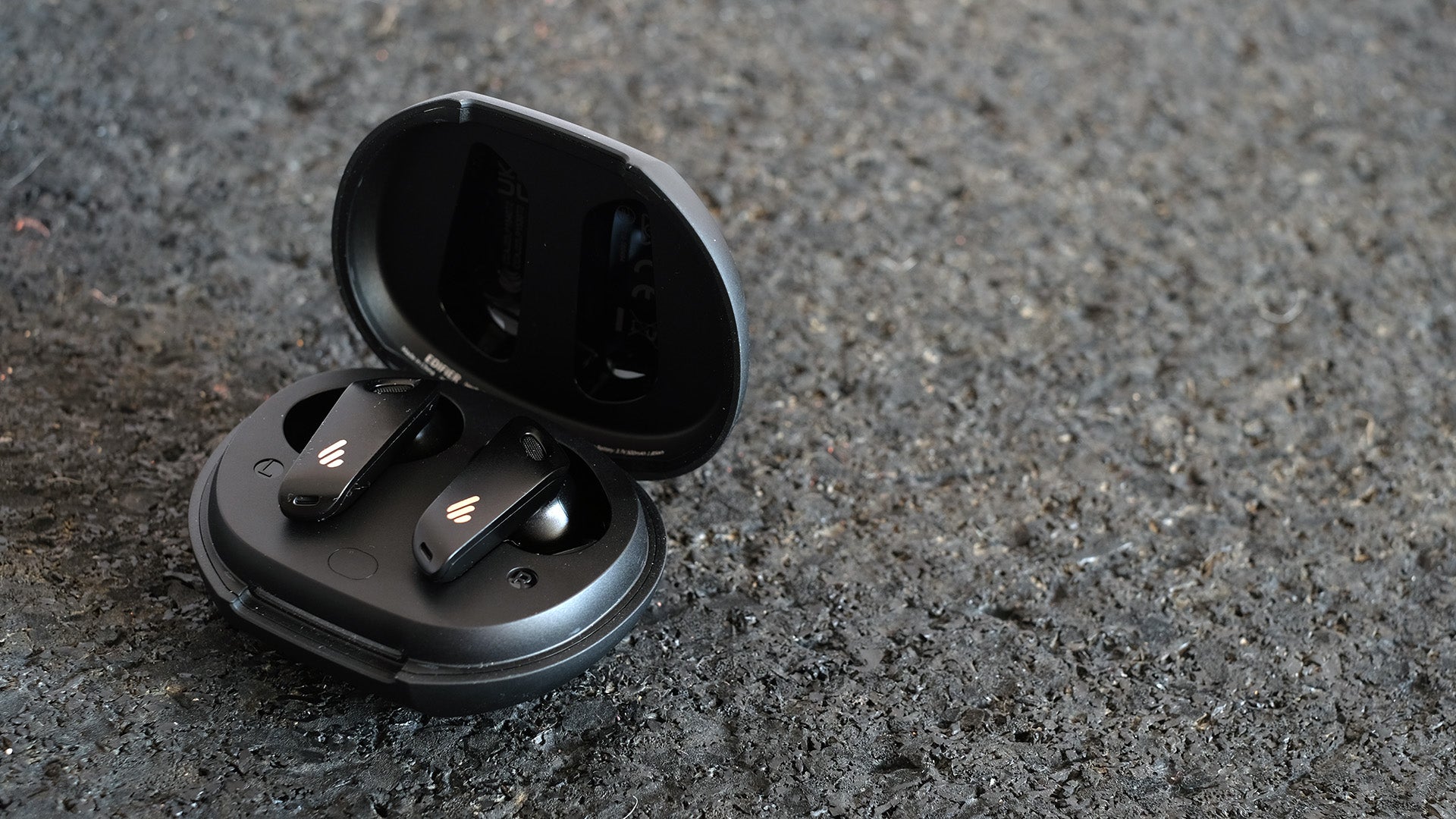The Edifier NeoBuds S are true wireless earphones with active noise cancellation and high-quality streaming over the relatively new Snapdragon Sound standard. However, they share some flaws with the previous NeoBuds Pro pair, and these are less easy to stomach at their higher price.
Pros
- Solid active noise cancellation
- Clear-sounding audio
- Uses and advanced wireless transmission standard
Cons
- Shallow fit tips aren’t great for exercise
- Higher frequencies can sound breash with some content
- More expensive than their predecessors
Availability
- UKRRP: £149.99
- USATBC
- EuropeTBC
- CanadaTBC
- AustraliaTBC
-
Active noise cancellationThese earphones have three microphones per earpiece, used to monitor and then cancel outside noise. -
Snapdragon SoundQualcomm’s Snapdragon Sound uses aptX Adapative to transmis sound at up to 24-bit 96kHz wirelessly. -
Game modeA dedicated gaming mode aims to lower latency to around 80ms, to make audio lag less obvious.
Introduction
The Edifier NeoBuds S are a new version of the Edifier NeoBuds Pro I reviewed in 2021. They add new tech including Snapdragon Sound, Bluetooth 5.2 and aptX Adaptive. But the price rises too. I reviewed the NeoBuds Pro at £100, this pair costs £150.
Price was always highly sensitive for this series. The NeoBuds Pro were mostly successful because they offered solid enough active noise cancellation, decent sound and fair battery life for under £100.
A higher price means the NeoBuds S have to compete more directly with big names from companies like Sony and Jabra. And the Edifier NeoBuds S don’t always come off that well in the comparison.
Some of the changes for this generation aren’t entirely positive either. The Edifier NeoBuds S’s shallow fit tips require re-seating fairly often, and a slight change to the sound signature that attempts to improve clarity can make for a more tiring listen with some content.
The Edifier NeoBuds S are solid true wireless earphones, but are a harder sell than the old set at £150.
Design
- Chunky, moody style
- IP54 water resistance
- Shallow fit tips are not great for exercise
The Edifier NeoBuds S are true wireless earphones with an all-round chunky style, just like the NeoBuds Pro.
Their earpieces have thick stalks that draw attention away from the blob of plastic that contains the drivers. While the outside part of the stalks look like they could be metal, the shells are plastic. This is sensible. Having larger true wireless earpieces is fine. But large and heavy ones? That can be a problem.
The Edifier NeoBuds S’s outer design takes the style of 2021’s NeoBuds Pro and simply makes it darker. This applies to both the earphones and the battery case. Parts that were silver are now black, and the Edifier logo is now gold to make sure it still sticks out.
New colour scheme: fine, great. However, Edifier has also changed the tip style, and it may cause some problems.
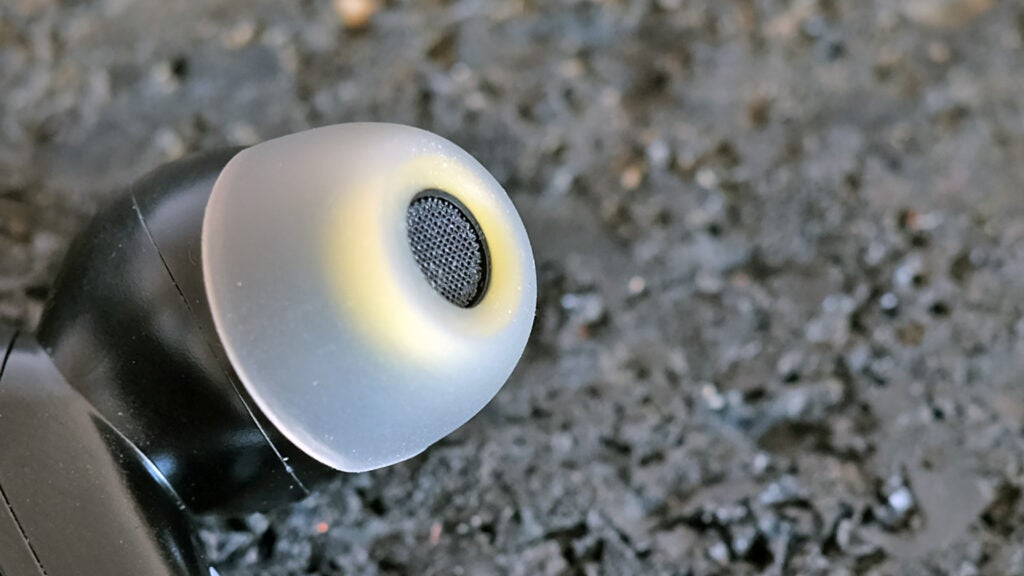
As you can see, the earphone aperture sits right at the surface of these silicone tips. It’s the same arrangement regardless of which of the seven pairs you use.
Edifier tries hard to make sure all sizes of ear canals are catered for, and this new tip style means the earpieces need to be shoved less far into your ear. However, I find they need adjusting far more often than the Edifier NeoBuds Pro did.
They don’t fall out, but the seal loses its integrity over time when you move about. Push them back in and you’ll hear bass power improve. I noticed this when I used the Edifier NeoBuds S while running, which is naturally going to speed up this process.
As with any fit issue, you may not have the same problem. I also have no issues with their comfort level, but I wouldn’t strongly recommend the Neobuds S to runners. Their water IP54 resistance is lower than most sports headphones, although is good enough to deal with sweat.

Features
- Solid active noise cancellation
- OK but not remarkable battery life
- Touch controls
The Edifier NeoBuds S have active noise cancellation, which uses six microphones to monitor and cancel out ambient noise. Edifier says the battery lasts around 5.5 hours with this feature switched on, or 6 hours using plain Bluetooth streaming.
After keeping an eye on the battery level over multiple longer listening sessions, this seems perhaps a slightly ambitious claim at the volume level I use. The figures suggest the Edifier NeoBuds S will last closer to 4 hours 25 minutes to 4 hours 40 minutes with active noise cancellation — at least at the point you “lose” your first earbud.
The left earpiece drains a little more quickly than the right one.
You pair the Edifier NeoBuds S when they are in their charging case. A long-press of the button inside the case puts them into pairing mode. This process works seamlessly, but as there are no physical buttons on the earphones themselves, leave them disconnected for long enough to enter their “sleep” state and you’ll have to put them back in the case to wake them up.
It’s a bit annoying if, like me, you approach your wireless earphones in an entirely disorganised way.
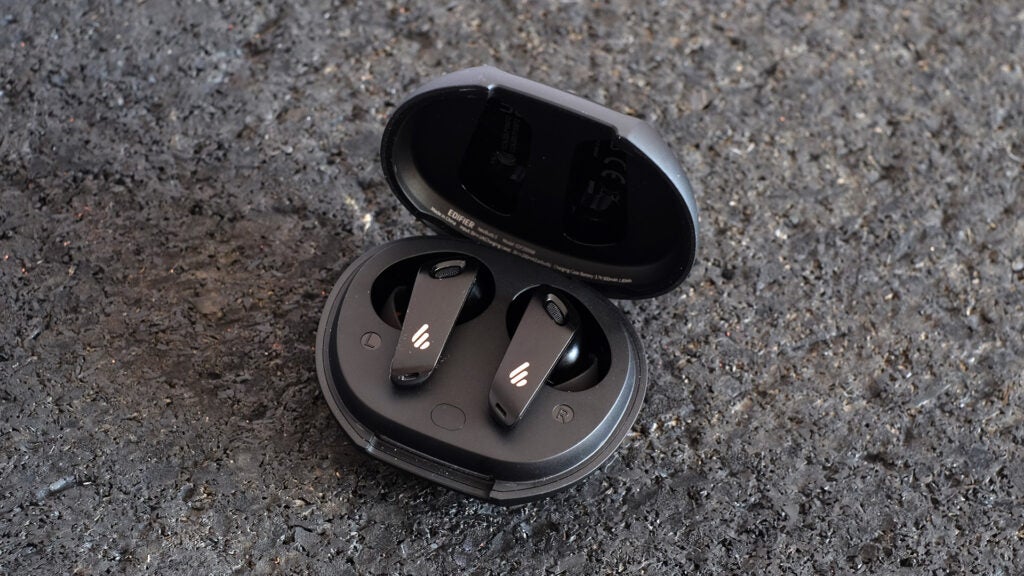
Controls on the Edifier NeoBuds S are handled using touch sensitive parts on each stalk. Double taps on the left one switch between noise cancellation and “ambient sound”, where outside noise is played through the drivers.
Double taps on the right earpiece play/pause. And triple taps on the right skip to the next track. These gestures work just fine. Accidental activations are super-rare as there’s no single-tap gesture, and they make you grateful for the fairly wide surface of the earpiece stalks.
Edifier does not appear to have made any progress with the effectiveness of its active noise cancellation, though. To my ears it seems as effective as that heard in the NeoBuds Pro.
It takes the edge off the sound of public transport. You’re less likely to need to need to boost music volume in noisier environments, but these earphones don’t whisk you away to an oasis of calm like the most effective ANC headphones.
Hook the Edifier NeoBuds S up to the Edifier app and you can switch between “high” and “low” active noise cancellation. The High mode is more effective, but also tweaks the sound a bit in ways that may not necessarily be desirable. More on that later.
Brand new NeoBuds S techy features are all about wireless transmission standards. They support aptX Adaptive and Snapdragon Sound.
Snapdragon Sound is a Qualcomm tech that can transmit at up to 24-bit, 96kHz, while aptX Adaptive transmits at rates of between 280-420kbps based on the situation.
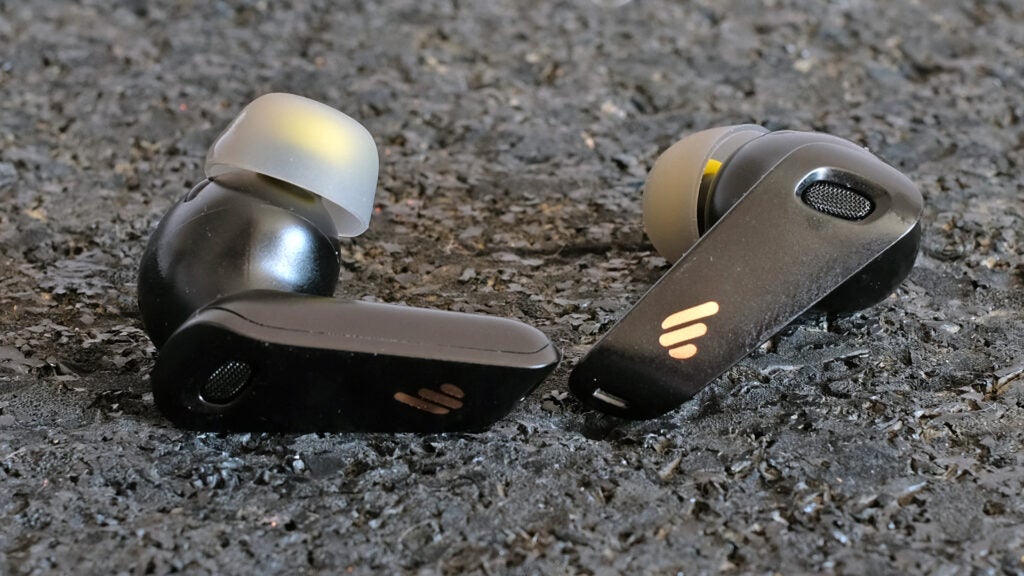
While it’s nice to have the latest tech, don’t focus too much on these impressive-sounding standards. Sound quality at this level is almost always determined more by driver tuning than the limits of your wireless stream — some of my favourite wireless headphones and speakers only had “crappy” SBC. A trip to Qualcomm’s website also shows how silly some of this stuff is, boasting about major improvements beyond about 22kHz. Human hearing taps out at around 20kHz. Or less if you’re not that young.
Snapdragon Sound does not appear to change latency. I couldn’t tell any major difference between the lag in the Edifier NeoBuds S and the earlier NeoBuds Pro. There’s a very slight delay, which can be trimmed a little by switching on the Game mode — Edifier says this reduces lag to 80ms, making YouTube lip-sync good enough to be watchable.
You can engage Game mode with a triple tap of the left earpiece, or in the Edifier app. This app also lets you apply EQ. There’s a Dynamic mode I’d suggest avoiding as it amps up the sound and brings out its flaws. You can also make your own EQ profiles, but the tools on offer are pretty bad.
They are unfriendly, and the default bands ignore the mid-range entirely — 100Hz, 2KHz, 4KHz and 8KHz. You can customise these a little, but this stuff is more hard work than it should be.
Sound Quality
- Bass and treble skewed sound
- Vital audio, but not a particularly natural style
- Some sound modes can push treble too far
The Edifier NeoBuds S have a driver array similar, or perhaps the same as, the Edifier NeoBuds Pro. They use one Knowles balanced armature and a 10mm dynamic driver.
These earphones can sound great, but as I heard with the NeoBuds Pro, they sound best when you attempt to curb Edifier’s house style a little. It likes powerful bass and pronounced highs, creating a “scooped” sound where the mids don’t get much attention at all.
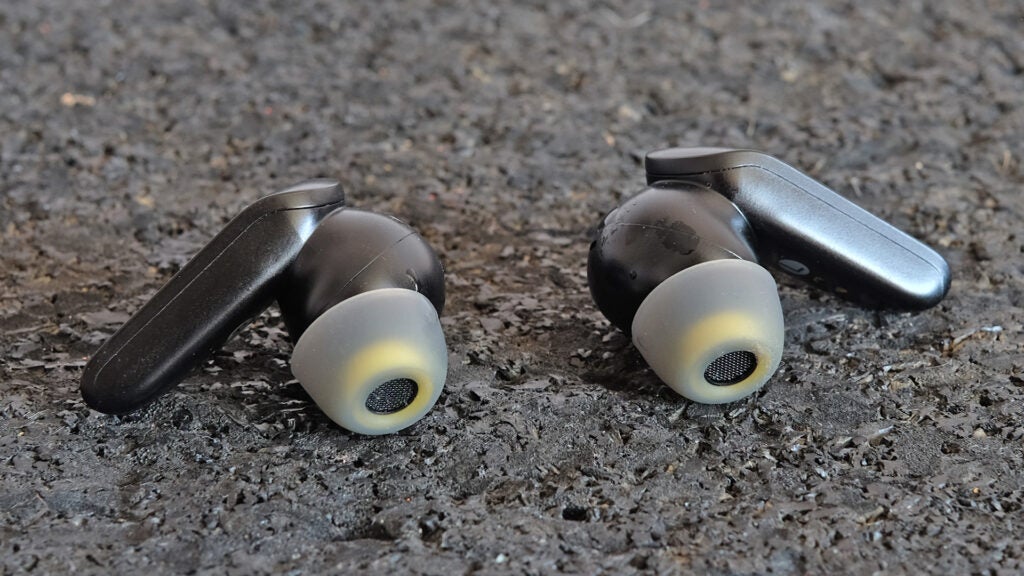
The Dynamic sound mode has more of this effect, because it boosts the higher frequencies for sparkier audio. Edifier’s High active noise cancellation setting does too, this time by bumping up the bass by a couple of decibels.
While adding bass to deal with noisier environment does make a sort of sense, as it’s the part of sound that gets lost quickest on public transport, the Edifier NeoBuds S shouldn’t need it if their ANC is good enough. And despite not raving about the cancellation’s effectiveness, I think it is good enough.
Switch to the Classic sound mode and use the Low Noise Cancellation mode for the most well-balanced sound, with a performance that’s engaging and vital, with powerful but not obviously overblown bass. Treble clarity is good, and while these earphones don’t have the classic delicate sensibility of the pure balanced armature pairs of old, the treble driver here pulls some precise and well-resolved upper-mid-range detail out of vocals.

Mid-range lovers should look elsewhere, though. Even in what I consider to be their most natural sound mode, the Edifier NeoBuds mids lack weight and substance, which becomes clear when I compared them to models from Klipsch’s T5 series. Those sets put much more attention into a fully coherent presentation of the mids.
The Edifier NeoBuds S and NeoBuds Pro show what a fine art headphone balancing is. Side-by-side they sound very similar, but the parts that stand out if you use the “wrong” mode are quite different.
In the NeoBuds Pro over-inflated bass is the most obvious issue in the High Noise Cancellation mode. Overly pronounced higher frequencies stand out more in the Edifier NeoBuds S. This is in part because this new pair seems to have greater upper-mid-range and lower treble definition regardless of the sound mode used.
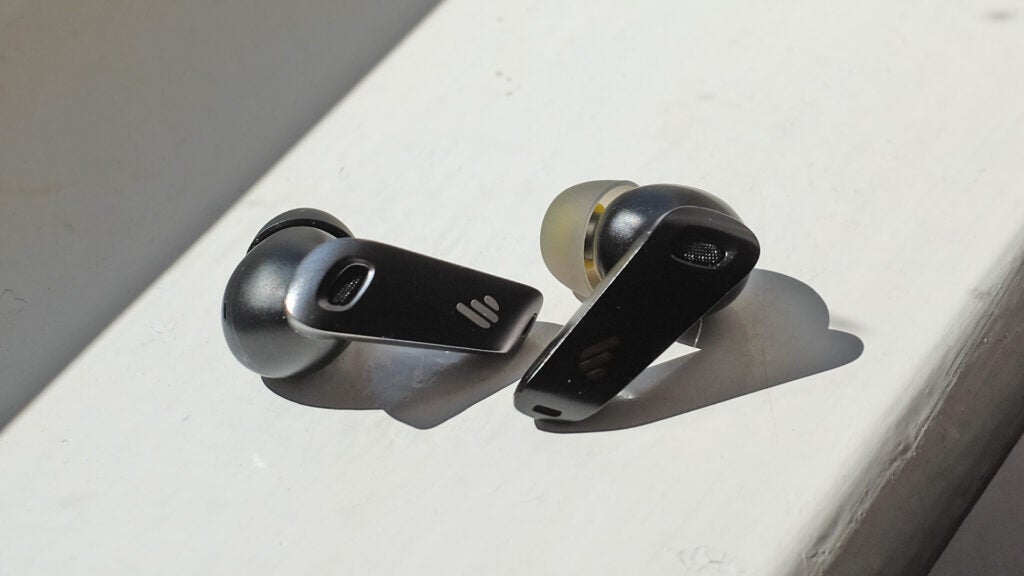
As well as risking overly granular or abrasive treble in some of the sound modes, this also helps to balance out the slight bass boost you hear on the High Noise Cancellation setting.
Vocals can often stand out in the mix a bit better in the Edifier NeoBuds S, but in the wrong mode I don’t like how spoken content, like podcasts, is presented too much. All top and bottom, with little in-between, it’s a reminder a flat signature is not really Edifier’s aim.
Latest deals
Should you buy it?
Lots of features These are feature-rich earphones, offering ANC, a cutting-edge wireless sound standard and treble-forward audio designed to max out detail and clarity.
Not all the changes work The NeoBuds S aren’t quite as good a deal as the older NeoBuds Pro, and a new tip style makes their fit less stable than before. You need to be careful with the software too, as some modes further unbalance the already non-neutral sound.
Final Thoughts
The Edifier NeoBuds S are similar to the NeoBuds Pro, but cost more. For the extra cash, LDAC streaming support is swapped for Snapdragon Sound with aptX Adaptive. It’s the latest in a fairly long line of wireless sound technologies that promise to deliver flawless audio.
These earphones sound fairly similar to their predecessors, but have slight greater definition in the upper mids. It can give vocals a little more presence in music. It can also make low bit-rate content like podcasts sound pretty bad in the wrong sound mode.
The Edifier NeoBuds S’s main issue is they’ve strayed out of the sub-£100 comfort zone. And while these earphones can sound good, Edifier’s unsubtle approach to sound processing stands out too much at £150.
How we test
We test every headphones we review thoroughly over an extended period of time. We use industry standard tests to compare features properly. We’ll always tell you what we find. We never, ever, accept money to review a product.
Find out more about how we test in our ethics policy.
Tested with real world use
FAQs
These earphones have basic IP54 water resistance, which is enough to deal with sweat but below the ideal IP67 sports earphone standard.
Yes, they have ANC with two intensity levels, and an ambient-aware mode. They use three mics in each earpiece for cancellation.
Snapdragon Sound offers wireless transmission of up to 24-bit 96KHz, good enough to be called “Hi-Res”.
Sustainability
Trusted Reviews’ holds the fact that global warming is not a myth as a core value and will continuously endeavour to help protect our planet from harm in its business practices.
As part of this mission, whenever we review a product we send the company a series of questions to help us gauge and make transparent the impact the device has on the environment.
We currently haven’t received answers to the questions on this product, but will update this page the moment we do. You can see a detailed breakdown of the questions we ask and why in our sustainability info page.
Jargon buster
Hi-Res Audio
Hi-Res audio is referred to as a standard as well as a marketing term that describes digital audio files of better-than-CD quality (16-bit/44.1kHz).
IP rating
An abbreviation for ‘Ingress Protection Code’, which lets you know to what extent a device might be waterproof or dustproof.
Bluetooth
Bluetooth – named after 10th-century Danish king Harald Bluetooth who united Denmark’s tribes into a single kingdom – is a method of wireless transmission that allows for the exchange of data between devices over short distances.


















